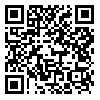Volume 13 -
IJMEHM 2020, 13 - : 168-179 |
Back to browse issues page
Download citation:
BibTeX | RIS | EndNote | Medlars | ProCite | Reference Manager | RefWorks
Send citation to:



BibTeX | RIS | EndNote | Medlars | ProCite | Reference Manager | RefWorks
Send citation to:
Nasiriani K, Fazlojoo S E, Dehghani Tafti A, Mobari Y. The Effect of Virtual Narrative Ethics Education on Moral Sensitivity in Critical Care Nurses. IJMEHM 2020; 13 :168-179
URL: http://ijme.tums.ac.ir/article-1-6180-en.html
URL: http://ijme.tums.ac.ir/article-1-6180-en.html
1- PhD of Nursing, Associate Professor, Department of Nursing, Research Center for Nursing and Midwifery Care & Mother and Newborn Health Research Center, Shahid Sadoughi University of Medical Sciences
2- MS in Nursing ,Instructor, Department of Nursing, Meybod School of Nursing, Shahid Sadoughi University of Medical Sciences
3- MS in Statistics, Instructor, Department of Vital Statistics, School of Health, Shahid Sadoughi University of Medical Sciences
4- M.Sc. in Student of Intensive Care Nursing, Nursing and Midwifery Care Research Center, School of Nursing and Midwifery, Shahid Sadoughi University of Medical Sciences
2- MS in Nursing ,Instructor, Department of Nursing, Meybod School of Nursing, Shahid Sadoughi University of Medical Sciences
3- MS in Statistics, Instructor, Department of Vital Statistics, School of Health, Shahid Sadoughi University of Medical Sciences
4- M.Sc. in Student of Intensive Care Nursing, Nursing and Midwifery Care Research Center, School of Nursing and Midwifery, Shahid Sadoughi University of Medical Sciences
Abstract: (3218 Views)
Moral sensitivity is the first step in making a moral decision and taking a moral judgment. An effort to promote nurses' moral sensitivity, education of ethical concepts, and using appropriate approaches to teaching ethics is still under discussion. Thus, this study was conducted to determine the effect of virtual teaching of ethical principles through narrative method on the ethical sensitivity of critical care nurses. In this quasi-experimental study, 60 critical care nurses were studied in two groups of test and control in 2 hospitals. The experimental group was taught ethical principles through virtual narrative method. Demographic information and Latezen moral sensitivity questionnaire were completed by nurses on three occasions (before, immediately after and two months after virtual education). Data were analyzed by SPSS 20 software. Results showed that the mean and standard deviation of nurses' moral sensitivity were 61.53 ± 9.24 before intervention and (60.60 ± 7.76 for the control group, and the association was not statistically significant (p> 0.05). However, there was a significant difference between the experimental group (77.50 ± 6.05) and the control group (60.83 ± 8.07 in the first post-test. In addition, there was a significant difference between the experimental and control groups (p <0.05) in the second post-test. Repeated measure analysis showed a significant difference between the ethical sensitivity scores in the experimental group, but no significant difference in the control group. According to the findings, the nurses' moral sensitivity was moderate at the beginning of the study, but after the intervention, the test group was at a high level and the control group was still at a moderate level. Thus, it is necessary to motivate nurses for recording and sharing their ethical challenges. Accordingly, they can promote their own ethical performance. Furthermore, their narratives can be used for education of other nurses and students of nursing.
Type of Study: Research |
Received: 2019/09/13 | Accepted: 2020/07/5 | Published: 2020/03/20
Received: 2019/09/13 | Accepted: 2020/07/5 | Published: 2020/03/20
| Rights and permissions | |
 |
This work is licensed under a Creative Commons Attribution-NonCommercial 4.0 International License. |





